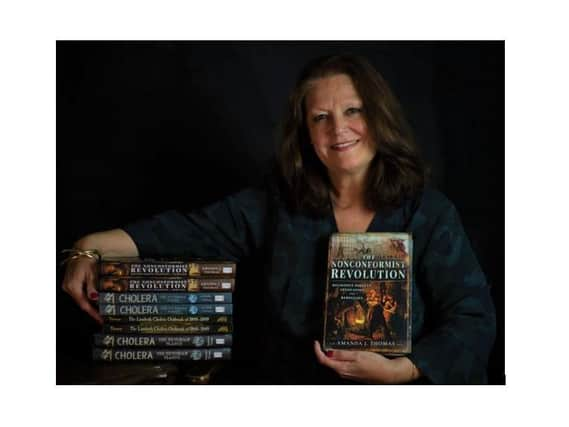Exploring Lewes's significance as a "dissenting hot-spot"


Author Amanda Thomas said: “The Nonconformist Revolution explores the development of our entrepreneurial, innovative spirit and our belief in individuality, freedom and justice.
“The development of Britain as an industrial, trading nation, with democracy and the welfare state at its heart, owes much to those in our history who dared think out of the box.
Advertisement
Hide AdAdvertisement
Hide Ad“Such men and women were nonconformist in every sense for while they challenged conventional, orthodox religion they also stood up for the rights of working people. Theirs was a vision which sparked innovation, yet it also ignited radicalism and revolution both at home and abroad. Thus far, book sales indicate that these are themes which interest and resonate with a great many people!
“The book should certainly interest people living in and around Sussex. Following the Reformation in the sixteenth century, nonconformist Protestantism became more prevalent in certain parts of the country, including the Wealden towns and villages of Sussex and Kent. The story of protestant dissent in Lewes is particularly interesting. With help from local historians and the Lewes History Group, I was able to devote an entire chapter to the history of the town and its influence since the Reformation as a dissenting hot-spot.
“Entitled The Lewes Connection, it looks at the development of religion and governance in the area, including the burnings of the protestant martyrs and the Fellowship of the Twelve.
“I discuss Lewes’ reputation for ‘the nurturing of new ideas and intellectual Protestantism’ which impacted on the evolution of radical philosophy, as well as the work of Lewes resident, Thomas Paine. Also included is a case study of the Barnard family and High Street draper Richard (c1610-1666) who expanded his fortune – and the Protestant cause – in Ireland during the English Civil Wars as an Adventurer for Land.
Advertisement
Hide AdAdvertisement
Hide Ad“The Weald is an area close to my heart for while I was born in Chatham, Kent, my roots stretch further south in the county. Somewhat unexpectedly, some time ago I also discovered that my Australian father’s great grandfather, David Roberts was born in 1844 in the Wealden village of Withyham in East Sussex. I joined the Sussex Family History Group to try and discover more, and now that this book has been published I might have more time to be able to!
“My initial interest in Nonconformism came from another family history discovery. A distant maternal ancestor, Simon Osmotherly was a Roundhead during the English Civil Wars and one of the founders of Quakerism in the North of England. I would like to think that he was the inspiration for his many outspoken – mainly Methodist – descendants who moved to Kent following the Restoration and who nurtured a talent for being outspoken, political and highly literate.
“However, from a young age I realised that my own love for learning was not universal. Whilst planning the book, I began asking all sorts of people their views on the value of education. I discovered that many, even in adulthood, did not fully appreciate it and, in some cases, this seemed to be a generational pattern. Of additional interest was how families with Nonconformist backgrounds appeared to value learning more and – somewhat controversially, perhaps – there was a potential socio-cultural link. Even before the Reformation, religious dissent was more prevalent amongst yeoman farmers, clothiers, artisans, and trades people, including shopkeepers.
“Literacy and dissent went hand in hand, because the only real way to understand religious texts was to be able to read them. It was a valuable skill – mostly taught by mothers - which not only facilitated religious enlightenment, but also raised an awareness in the rights and wrongs of society and additionally provided a key business tool. As I broadened my research, I discovered a more intriguing connection between innovative thinking and Nonconformity. Many – if not most – of the greatest inventors, scientists and radical influencers of the industrial age came from families which had become disillusioned with the orthodox Protestant Church.”
Comment Guidelines
National World encourages reader discussion on our stories. User feedback, insights and back-and-forth exchanges add a rich layer of context to reporting. Please review our Community Guidelines before commenting.